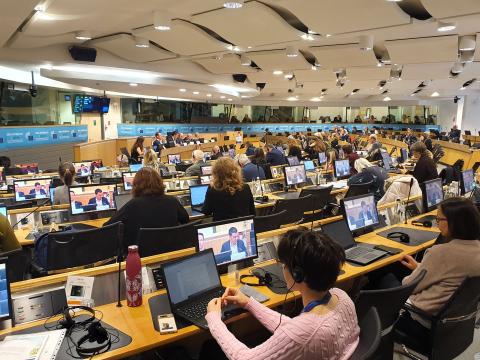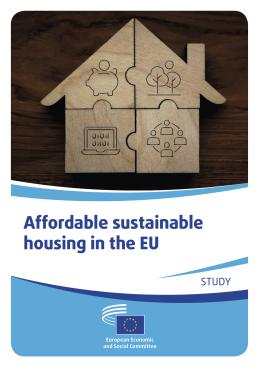European Economic
and Social Committee
The EU needs a pan-European policy response to its housing crisis
Greater use of digitalisation in the construction and housing industry and the involvement of social economy actors in housing provision can bring opportunities to address current challenges in the area of housing affordability and sustainability in Europe. Since housing is not just a need but a human right, a pan-European response to the various challenges is needed, according to a conference organised by the Civil Society Organisations’ Group of the European Economic and Social Committee (EESC) on 21 November, at which a new EESC study on the subject was presented.
Many Europeans struggle to find affordable housing. In the EU in 2023, housing costs exceeded 40% of the disposable income for 10.6% of urban and 7% of rural households (Eurostat figures). According to a Eurobarometer survey from July 2024, rising prices and the cost of living (42%) and the economic situation (41%) were the main issues motivating people to vote in the European elections.
This prompted the Civil Society Organisations’ Group to organise a conference to discuss how the EU and its Member States can make housing conditions across Europe more inclusive, affordable and sustainable, in line with the European Pilar of Social Rights. The event was attended by civil society representatives from the national and the European level, as well as institutional stakeholders.
Séamus Boland, President of the Civil Society Organisations’ Group, opened the conference by stressing that access to adequate housing constitutes a human right that requires a pan-European approach. He highlighted the link between increasing housing prices and poverty levels. ‘The provision of affordable and sustainable housing is central to poverty eradication’, he said.
Mr Boland also underlined that ‘the EU Anti-Poverty Strategy and European Affordable Housing Plan proposed by the European Commission President-elect must be part of a cross-sectoral policy approach to end poverty. This approach must involve civil society organisations in the entire process of designing, implementing and monitoring solutions. Sustainable housing must be examined from a broader perspective, encompassing resource efficiency and circularity, resilience and adaptation, and economic accessibility’.
In fact, residential housing is responsible for 17% of all global green-house gas emissions. This demonstrates the links between housing and sustainability. In addition, the housing cost overburden rate[1] is significantly higher among people at risk of poverty and low-income households.
Marcos Ros Sempere, Member of the European Parliament (S&D Group), said ‘The housing problem is a major concern for all Europeans and prevents young people from starting an independent life. For the very first time, we will have a Commissioner for Energy and Housing, and the Parliament will create a special committee on Housing. We will work on a European Affordable Housing Strategy. This EU legislature will be key to advance on proposals to solve the housing crisis’.
The event featured the presentation of a new EESC study entitled ‘Affordable sustainable housing in the EU’ that was commissioned by the EESC at the request of the Civil Society Organisations’ Group.
Agnieszka Maj, co-author of the study and economist at the Center for Social and Economic Research (CASE), said: ‘A New European Deal for Affordable Sustainable Housing is essential and should prioritise digitalisation, the social economy and innovative policies to ensure accessible housing for all’.
The new EESC study explores policy solutions for affordable and sustainable housing in the EU. It investigates two emerging trends: digitalisation and the integration of social economy actors into housing provision. The study examines innovative initiatives in six Member States – Denmark, France, the Netherlands, Austria, Poland and Spain – and determines their potential in the European context.
The research offers medium and long-term policy recommendations including:
- An EU Housing Directive for a coordinated and cohesive approach to housing challenges, leveraging best practices and providing a framework for Member States to follow, while housing remains a national competence;
- Enhancing the digitalisation of the building permit process, e.g. through investment in interoperable digital platforms that can facilitate seamless communication and data exchange;
- Actively facilitating the growth of the limited-profit housing model and cooperatives through the public administration, including land provision on long-term leave.
Conference participants called for solutions, particularly to address the housing problems faced by the most vulnerable groups in European societies, including people with disabilities, the Roma community and certain types of families. It was suggested that affordable social housing could be achieved through better financing, capping rents and combating speculation. Moreover, the EU should put accessibility at the heart of its housing policies, adopt a families-sensitive approach to ensure a better match between supply and demand, and address segregation and discrimination in the sector. The latter also required adequate infrastructure. The participants also urged support for community driven and local solutions for sustainable and affordable housing.
[1] The housing cost overburden rate is the percentage of the population living in households where the total housing costs ('net' of housing allowances) represent more than 40 % of disposable income ('net' of housing allowances). More: https://europa.eu/!nXGmV7.
Work organisation
Downloads
-
PR - The EU needs a pan-European policy response to its housing crisis

